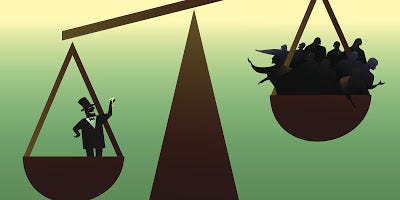The Unsustainable cannot be Sustained

There was a shocking headline in today’s Guardian newspaper: World's eight richest people have same wealth as poorest 50%. Shocking, from several points of view:
First of all, reading further into the article, two years ago the sixty-four wealthiest people in the world held that title. Last year the number has been reduced to eight. Most fair-minded folks will feel such a statistic is beyond their ability to comprehend such a fact. Others will decry the system that supports such uneven distribution, while a third bunch will make a call for pitchforks and barricades. The wretched and poor of the planet have no voice, so we are unable to ask their opinion. They are, to a large extent, too concerned about simply making it day-to-day without losing a child to starvation.
I make no claims against the fairness, comprehension, revolution or silent deaths of tens of millions. Nor do I decry the motives of the wealthy. Many are those I call the ‘accidentally rich,’ like Mark Zuckerberg, the founder of Facebook, or those who lucked in to early investment in industries as rare as a lightning-strike. Others built businesses with dogged determination or a dream in mind and the money came as a side issue. That might include Bill Gates, Warren Buffett and Michael Bloomberg. They are not any of the eight evil men and most are among our largest benefactors to charity.
My claim is that such trends are unsustainable and that we must therefore find a way to reverse what cannot be sustained before we crumble to dust as a civilization. Surely such horrendous income inequality is simply one of many. Regardless of our general ignorance and eagerness to consume, global climate-change is swallowing the planet’s biodiversity. We can do something about that, but short-term politics and a downward spiral to cheap labor and investor-returns stands in the way. Political power is in chaos across the world and investor-returns are busily eating their own young.
Our heady ‘consumer economy’ is at the brink of killing off the consumer-class that feeds it, as individuals and families struggle to survive, much less buy a new car or retire the old refrigerator. Our best young people suffocate under educational debt, while only a few can find jobs. Who will be left to consume, as society slowly sinks to the bottom?
Robots and algorithms are not the scare of the future, they are the future and we must find a way to equitably support those they make jobless. More economists (and even politicians) are talking seriously about guaranteed national incomes because we dare not break the future that technology has chosen to thrust upon us.
Nor should we, as technology, in its current state is the driver behind steeply rising standards of living throughout the world. According to Pew Research, from 2001 to 2011, nearly 700 million people stepped out of poverty, but most only barely. Those who Pew defined as middle income lived on $10-20 a day, a far cry from Western standards. Those massed below them often struggle on a single dollar a day. Steeply rising is more a statistic than definition and, as we know, if you torture statistics sufficiently they will confess to anything.
Technology has risen at a blindingly fast rate over the past several decades and the metaphor is accurate. We are apparently blind to its promise, blind to its social and economic possibilities and blinder yet to its equitable distribution. The human condition is at stake and we are blind to its salvation economically and environmentally, at least in the short-term. And the short-term may be all that is left.
The long-term as we currently practice it, is unsustainable.
